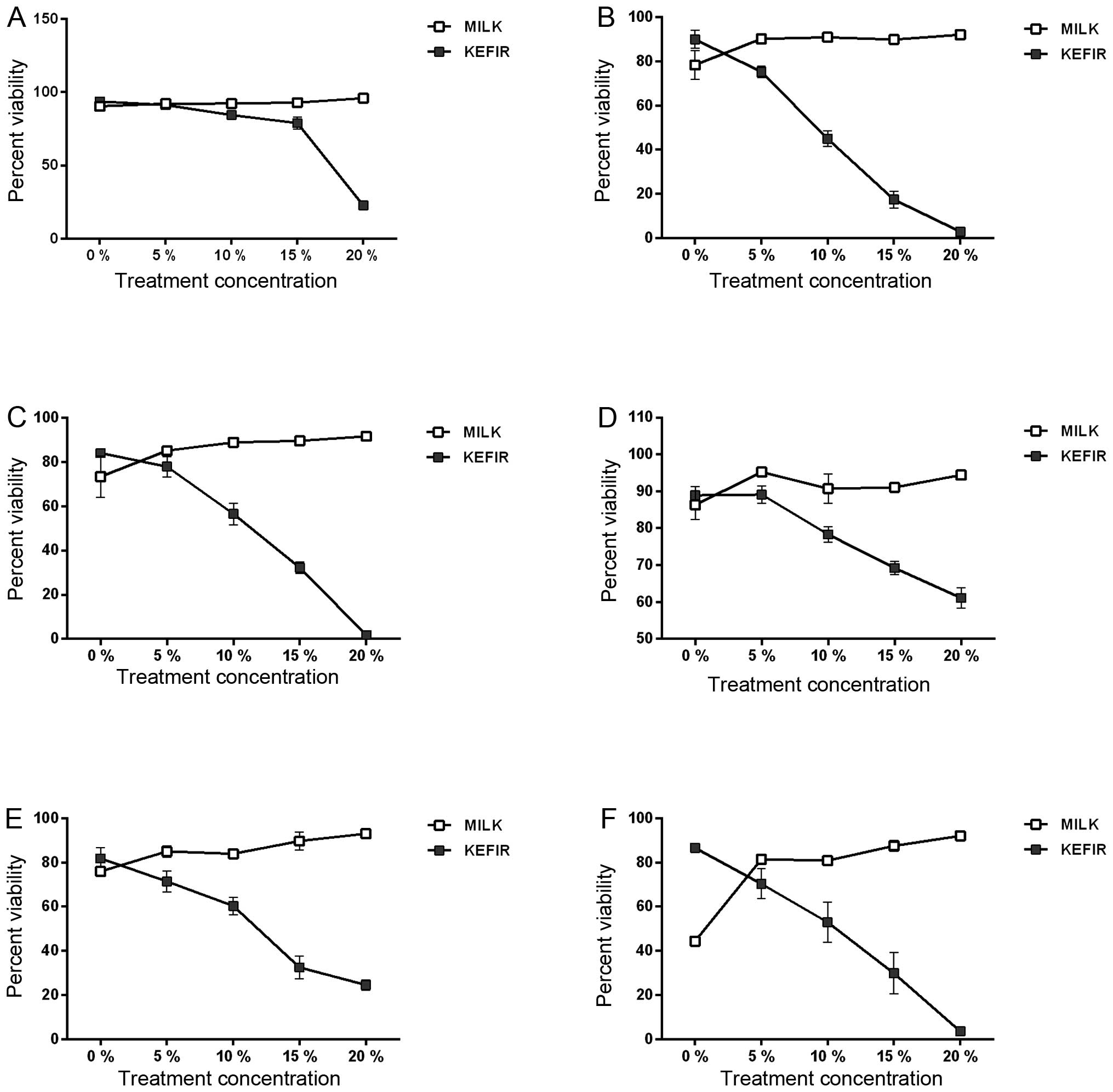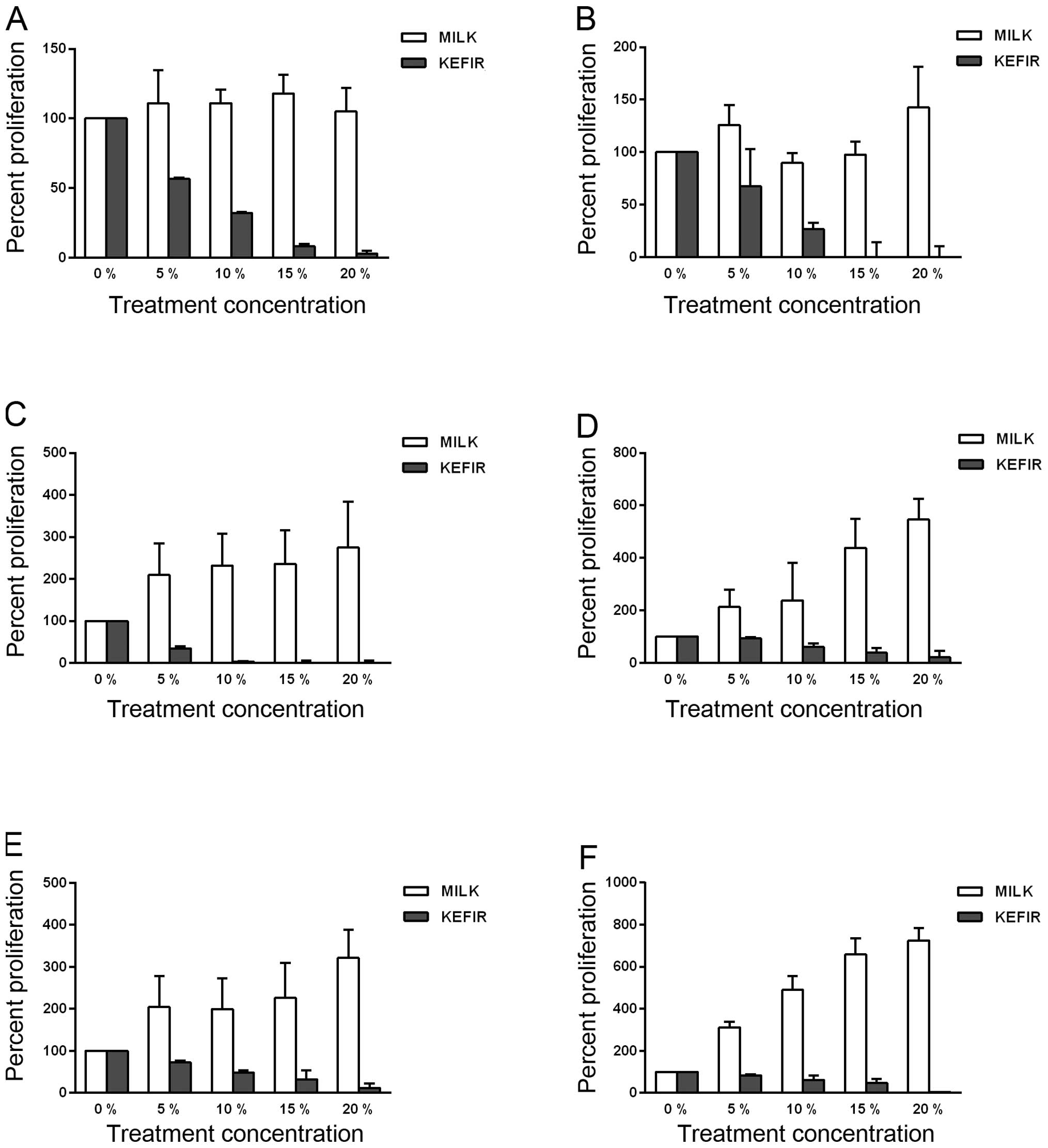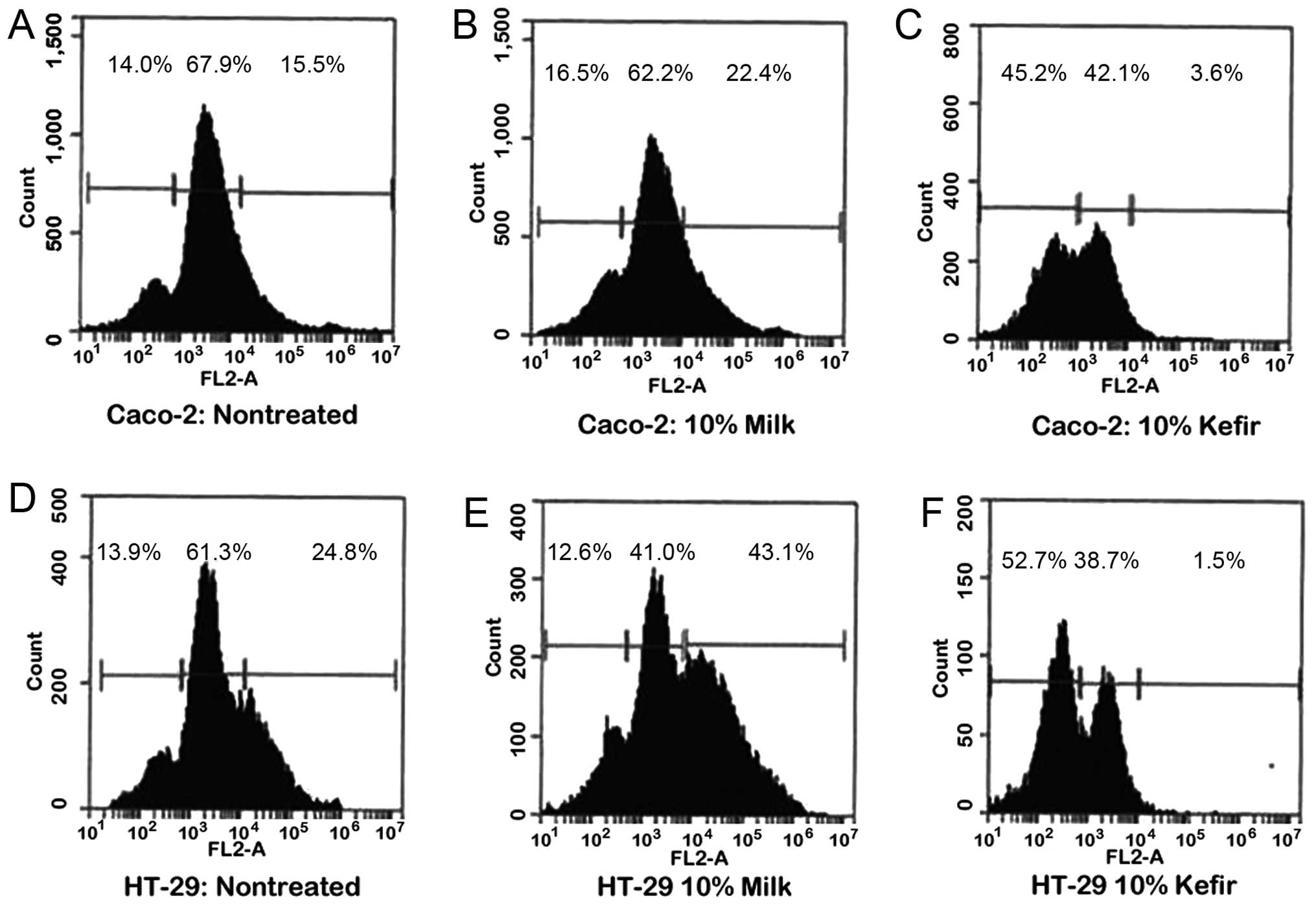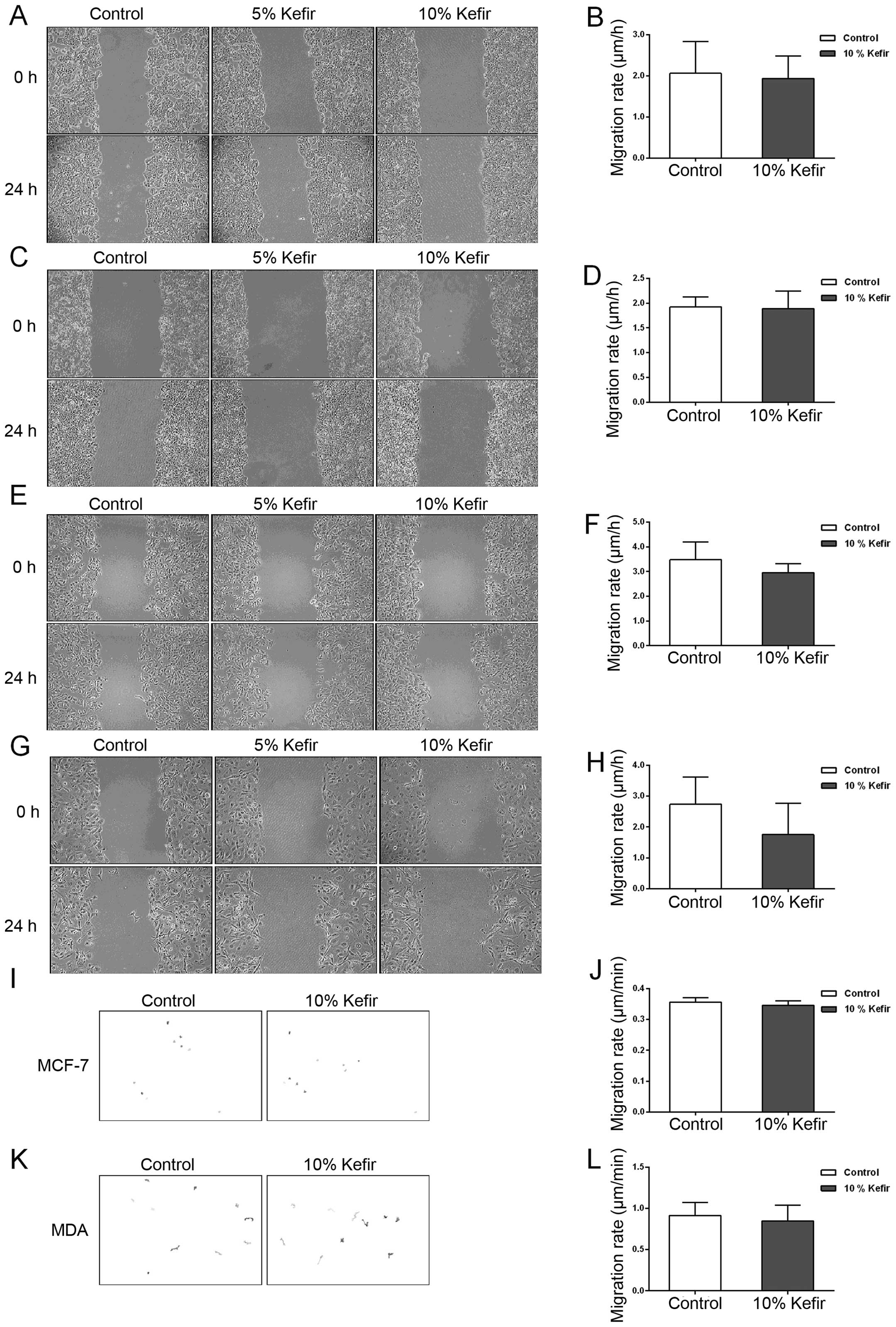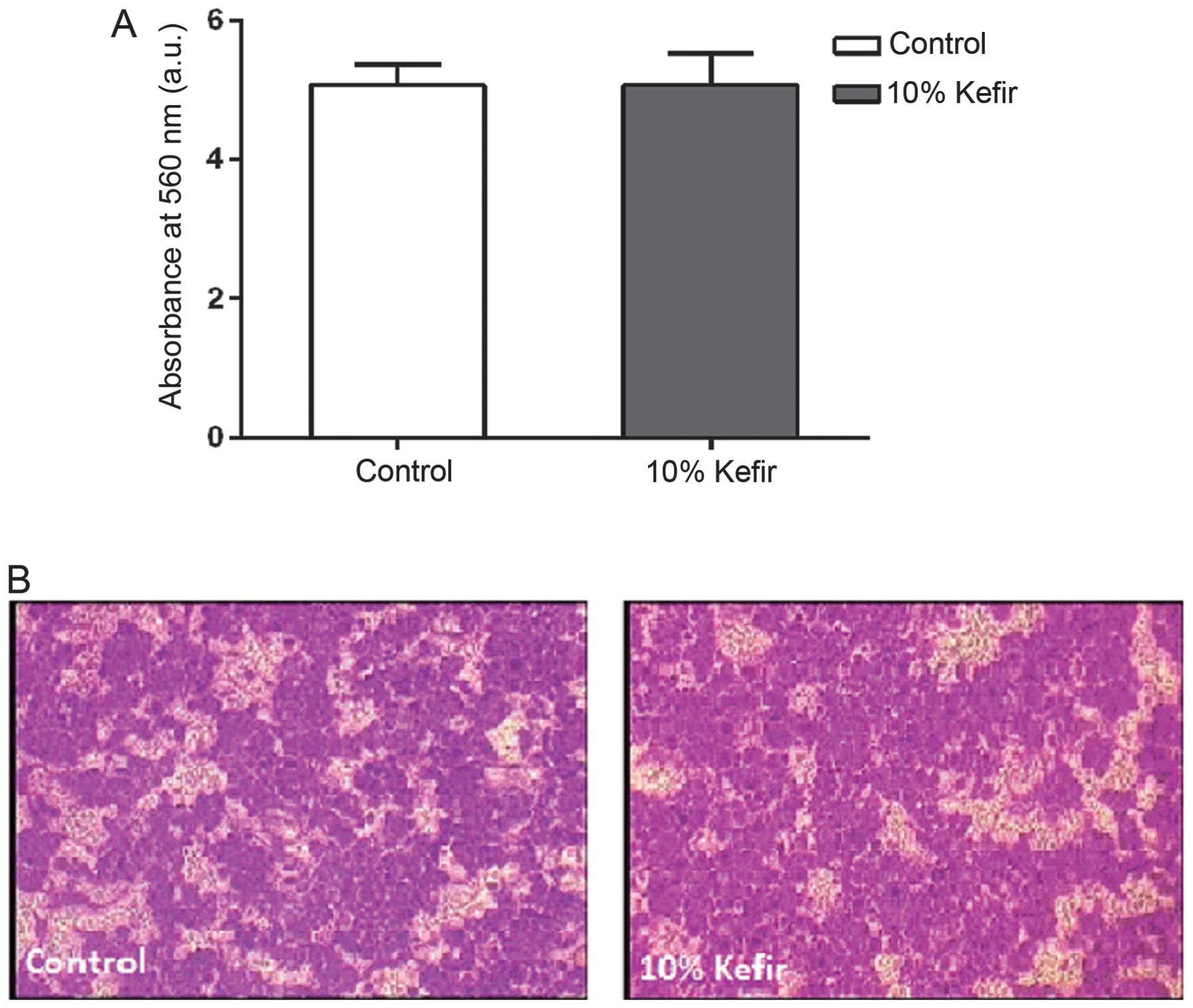|
1
|
Adriana P and Socaciu C: Probiotic
activity of mixed cultures of kefir’s lactobacilli and non-lactose
fermenting yeasts. Agric. 65:329–334. 2008.
|
|
2
|
Farnworth ER: Kefir - a complex probiotic.
Food Sci Technol Bull. 2:1–17. 2005.
|
|
3
|
Angulo L, Lopez E and Lema C: Microflora
present in kefir grains of the Galician region (north-west of
Spain). J Dairy Res. 60:263–267. 1993. View Article : Google Scholar : PubMed/NCBI
|
|
4
|
Lopitz-Otsoa F, Rementeria A, Elguezabal N
and Garaizar J: Kefir: a symbiotic yeasts-bacteria community with
alleged healthy capabilities. Rev Iberoam Micol. 23:67–74.
2006.PubMed/NCBI
|
|
5
|
Simova E, Simov Z, Beshkova D, Frengova G,
Dimitrov Z and Spasov Z: Amino acid profiles of lactic acid
bacteria, isolated from kefir grains and kefir starter made from
them. Int J Food Microbiol. 107:112–123. 2006. View Article : Google Scholar : PubMed/NCBI
|
|
6
|
Liu JR, Wang SY, Lin YY and Lin CW:
Antitumor activity of milk kefir and soy milk kefir in
tumor-bearing mice. Nutr Cancer. 44:182–187. 2002.PubMed/NCBI
|
|
7
|
Vinderola G, Perdigón G, Duarte J,
Farnworth E and Matar C: Effects of the oral administration of the
exopolysaccharide produced by Lactobacillus kefiranofaciens
on the gut mucosal immunity. Cytokine. 36:254–260. 2006. View Article : Google Scholar : PubMed/NCBI
|
|
8
|
Hertzler SR and Clancy SM: Kefir improves
lactose digestion and tolerance in adults with lactose
maldigestion. J Am Diet Assoc. 103:582–587. 2003. View Article : Google Scholar : PubMed/NCBI
|
|
9
|
Liu JR, Wang SY, Chen MJ, Chen HL, Yueh PY
and Lin CW: Hypocholesterolaemic effects of milk-kefir and
soyamilk-kefir in cholesterol-fed hamsters. Br J Nutr. 95:939–946.
2006. View Article : Google Scholar
|
|
10
|
Preidis GA, Hill C, Guerrant RL,
Ramakrishna BS, Tannock GW and Versalovic J: Probiotics, enteric
and diarrheal diseases, and global health. Gastroenterology.
140:8–14. 2011. View Article : Google Scholar : PubMed/NCBI
|
|
11
|
Chen C, Chan HM and Kubow S: Kefir
extracts suppress in vitro proliferation of estrogen-dependent
human breast cancer cells but not normal mammary epithelial cells.
J Med Food. 10:416–422. 2007. View Article : Google Scholar : PubMed/NCBI
|
|
12
|
Rodrigues KL, Caputo LR, Carvalho JC,
Evangelista J and Schneedorf JM: Antimicrobial and healing activity
of kefir and kefiran extract. Int J Antimicrob Agents. 25:404–408.
2005. View Article : Google Scholar : PubMed/NCBI
|
|
13
|
Shiomi M, Sasaki K, Murofushi M and Aibara
K: Antitumor activity in mice of orally administered polysaccharide
from Kefir grain. Jpn J Med Sci Biol. 35:75–80. 1982. View Article : Google Scholar : PubMed/NCBI
|
|
14
|
Murofushi M, Shiomi M and Aibara K: Effect
of orally administered polysaccharide from kefir grain on
delayed-type hypersensitivity and tumor growth in mice. Jpn J Med
Sci Biol. 36:49–53. 1983. View Article : Google Scholar : PubMed/NCBI
|
|
15
|
Murofushi M, Mizuguchi J, Aibara K and
Matuhasi T: Immunopotentiative effect of a polysaccharide from
kefir grain, KGF-C, administered orally in mice.
Immunopharmacology. 12:29–35. 1986. View Article : Google Scholar : PubMed/NCBI
|
|
16
|
Furukawa N, Matsuoka A and Yamanaka Y:
Effects of orally administered yoghurt and kefir on tumor growth in
mice. J Jpn Soc Nutr Food Sci. 43:450–453. 1990. View Article : Google Scholar
|
|
17
|
Kubo M, Odani T, Nakamura S, Tokumaru S
and Matsuda H: Pharmacological study on kefir - a fermented milk
product in Caucasus. I. On antitumor activity (1). Yakugaku Zasshi.
112:489–495. 1992.(In Japanese).
|
|
18
|
Rizk S, Maalouf K and Baydoun E: The
antiproliferative effect of kefir cell-free fraction on HuT-102
malignant T lymphocytes. Clin Lymphoma Myeloma. (Suppl 3):
S198–S203. 2009. View Article : Google Scholar : PubMed/NCBI
|
|
19
|
Maalouf K, Baydoun E and Rizk S: Kefir
induces cell-cycle arrest and apoptosis in HTLV-1-negative
malignant T-lymphocytes. Cancer Manag Res. 3:39–47. 2011.PubMed/NCBI
|
|
20
|
Furukawa N, Matsuoka A, Takahashi T and
Yamanaka Y: Anti-metastatic effect of kefir grain components on
Lewis lung carcinoma and highly metastatic B16 melanoma in mice. J
Agric Sci Tokyo Nogyo Daigaku. 45:62–70. 2000.
|
|
21
|
Siegel R, Naishadham D and Jemal A: Cancer
statistics, 2013. Cancer J Clin. 2013.63:11–30
|
|
22
|
Hamilton SR: The molecular genetics of
colorectal neoplasia. Gastroenterology. 105:3–7. 1993.PubMed/NCBI
|
|
23
|
Hoff G, Foerster A, Vatn MH, Sauar J and
Larsen S: Epidemiology of polyps in the rectum and colon. Recovery
and evaluation of unresected polyps 2 years after detection. Scand
J Gastroenterol. 21:853–862. 1986.PubMed/NCBI
|
|
24
|
Wolpin BM and Mayer RJ: Systemic treatment
of colorectal cancer. Gastroenterology. 134:1296–1310. 2008.
View Article : Google Scholar : PubMed/NCBI
|
|
25
|
Messersmith WA and Hidalgo M: Panitumumab,
a monoclonal anti-epidermal growth factor receptor antibody in
colorectal cancer: another one or the one? Clin Cancer Res.
13:4664–4666. 2007. View Article : Google Scholar
|
|
26
|
Arteaga C: Targeting HER1/EGFR: a
molecular approach to cancer therapy. Semin Oncol. (3 Supp 7):
S3–S14. 2003. View Article : Google Scholar : PubMed/NCBI
|
|
27
|
Rodriguez-Bigas MA, Lin EH and Crane CH:
Stage IV colorectal cancer. Holland-Frei Cancer Medicine. Kufe DW,
Pollock RE, Weichselbaum RR, Bast RC, Gansler TS, Holland JF and
Frei E: 2. 6th edition. Hamilton, ON: 2003
|
|
28
|
Hassan MS, Ansari J, Spooner D and Hussain
SA: Chemotherapy for breast cancer (Review). Oncol Rep.
24:1121–1131. 2010. View Article : Google Scholar : PubMed/NCBI
|
|
29
|
Palmer TD, Ashby WJ, Lewis JD and Zijlstra
A: Targeting tumor cell motility to prevent metastasis. Adv Drug
Deliv Rev. 63:568–581. 2011. View Article : Google Scholar : PubMed/NCBI
|
|
30
|
Ji H, Zhao X, Yuza Y, Shimamura T, Li D,
Protopopov A, Jung BL, McNamara K, Xia H, Glatt KA, et al:
Epidermal growth factor receptor variant III mutations in lung
tumorigenesis and sensitivity to tyrosine kinase inhibitors. Proc
Natl Acad Sci USA. 103:7817–7822. 2006. View Article : Google Scholar : PubMed/NCBI
|
|
31
|
Liu C, Woo A and Tsao MS: Expression of
transforming growth factor-alpha in primary human colon and lung
carcinomas. Br J Cancer. 62:425–429. 1990. View Article : Google Scholar : PubMed/NCBI
|
|
32
|
Sasaki T, Nakamura T, Rebhun RB, Cheng H,
Hale KS, Tsan RZ, Fidler IJ and Langley RR: Modification of the
primary tumor microenvironment by transforming growth factor
alpha-epidermal growth factor receptor signaling promotes
metastasis in an orthotopic colon cancer model. Am J Pathol.
173:205–216. 2008. View Article : Google Scholar
|
|
33
|
Ueda M, Fujii H, Yoshizawa K, Terai Y,
Kumagai K, Ueki K and Ueki M: Effects of EGF and TGF-alpha on
invasion and proteinase expression of uterine cervical
adenocarcinoma OMC-4 cells. Invasion Metastasis. 18:176–183. 1998.
View Article : Google Scholar : PubMed/NCBI
|
|
34
|
Hölting T, Siperstein AE, Clark OH and Duh
QY: Epidermal growth factor (EGF)-and transforming growth factor
alpha-stimulated invasion and growth of follicular thyroid cancer
cells can be blocked by antagonism to the EGF receptor and tyrosine
kinase in vitro. Eur J Endocrinol. 132:229–235. 1995.
|
|
35
|
Massagué J: TGFβ signalling in context.
Nat Rev Mol Cell Biol. 13:616–630. 2012.
|
|
36
|
Halder SK, Beauchamp RD and Datta PK: A
specific inhibitor of TGF-beta receptor kinase, SB-431542, as a
potent antitumor agent for human cancers. Neoplasia. 7:509–521.
2005. View Article : Google Scholar : PubMed/NCBI
|
|
37
|
Xiong B, Yuan HY, Hu MB, Zhang F, Wei ZZ,
Gong LL and Yang GL: Transforming growth factor-beta1 in invasion
and metastasis in colorectal cancer. World J Gastroenterol.
8:674–678. 2002.PubMed/NCBI
|
|
38
|
Thiery JP, Acloque H, Huang RY and Nieto
MA: Epithelial-mesenchymal transitions in development and disease.
Cell. 139:871–890. 2009. View Article : Google Scholar : PubMed/NCBI
|
|
39
|
Ramesh S, Wildey GM and Howe PH:
Transforming growth factor beta (TGFbeta)-induced apoptosis: the
rise and fall of Bim. Cell Cycle. 8:11–17. 2009. View Article : Google Scholar : PubMed/NCBI
|
|
40
|
Akhurst RJ and Hata A: Targeting the TGFβ
signalling pathway in disease. Nat Rev Drug Discov. 11:790–811.
2012.
|
|
41
|
Morris JC, Shapiro GI, Tan AR, Lawrence
DP, Olencki TE, Dezube BJ, Hsu FJ, Reiss M and Berzofsky JA: Phase
I/II study of GC1008: a human anti-transforming growth factor-beta
(TGFβ) monoclonal antibody (MAb) in patients with advanced
malignant melanoma (MM) or renal cell carcinoma (RCC). J Clin
Oncol. 26(Suppl 15): S90282008.
|
|
42
|
Fidler IJ: The pathogenesis of cancer
metastasis: the ‘seed and soil’ hypothesis revisited. Nat Rev
Cancer. 3:453–458. 2003.
|















